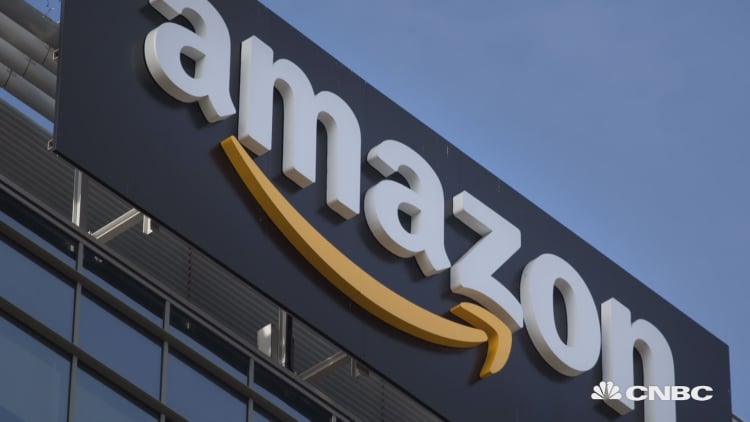
Amazon is in early talks with financial institutions including J.P. Morgan Chase to help launch checking account-like products, aimed at younger customers and those without bank accounts, The Wall Street Journal reported Monday.
This is the latest move by the e-commerce giant to solve one of the biggest barriers to shopping on its website: lack of a credit card.
More than a quarter of U.S. households have no or limited access to checking and savings accounts. These so-called unbanked and underbanked households rely heavily cash or checks to fund their purchases, making shopping online difficult. Unbanked doesn't necessarily mean unconnected, about 6 in 10 unbanked consumers have a smartphone, according to the Pew Charitable Trusts.
For Amazon, this group of shoppers is increasingly vital. New prime subscriptions flattened in the third quarter of 2017, according to analysts at Morgan Stanley. Another survey by Piper Jaffray in June said that 82 percent of U.S. households with more than $112,000 in annual income are already Prime members. Its reach is the lowest among those that make less than $41,000 a year.
Meantime, millennials are increasingly eschewing credit cards, as they tend to be more distrustful of banking institutions than their predecessors. Thirty-three percent of millennials said they do not anticipate needing a bank account in the next five years, according to a 2015 report by Goldman Sachs.
Online retailers make more money by getting shoppers to make repeat purchases — even if at a low dollar value — than they do if those shoppers spend a lot at once. Amazon has therefore been slowly building its base of products for lower-income shoppers. This past summer, it launched a discounted Prime service for those enrolled in the government's Supplemental Nutrition Assistance Program, commonly known as food stamps, with an EBT card. The electronic benefit transfer card works much the way a debit card does.
It also upped its partnership with 7-Eleven, which already housed Amazon's delivery "lockers" —pick-up locations for Amazon orders.
In November, it announced that shoppers at 7-Eleven stores nationwide could deposit as little as $15 and as much as $500 into an Amazon account through its "Amazon cash" program. Shoppers can then use that cash to shop on Amazon. Nearly one-half of the U.S. population lives within one mile of a 7-Eleven store.
"We felt we had a market opportunity, how do I create digital inclusion for consumers who are unable to take part in the digital economy. Amazon Cash is part of that overall strategy," Gurmeet Singh, chief digital officer and chief information officer at 7-Eleven, told CNBC in a previous interview.
Amazon has launched similar programs with CVS, Speedway, Sheetz and other stores.
Amazon did not immediately respond to requests for comment.
Walmart's turf
In its push to go after a new customer, Amazon finds itself strictly in Walmart's territory. Roughly half of Walmart's shoppers had an income of less than $49,900, according to a 2015 presentation to analysts.
Its 5,000 stores are scattered throughout the country, and are frequently the only option in shopping deserts for rural or lower-income shoppers. Ninety percent of the U.S. population lives within 10 miles of a Walmart.
In light of that shopping base, the retailer has been experimenting with in-store financing options for years. Its Sams Club stores offer small business loans and Walmart has money-centers in a number of its stores.
"They know a lot more about those people than Amazon," says Ryan Metcalf, director of international markets at financial technology start-up Affirm.
More recently, Walmart has looked to ways to bring those tools online. It has been working with Affirm to help offer shoppers financing on its home goods Hayneedle website and Allswell mattress and bedding website.
Affirm's Metcalf declined to comment on the partnership with Walmart.


